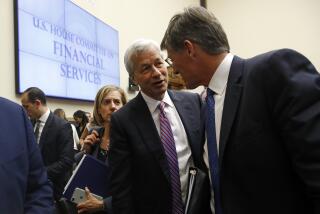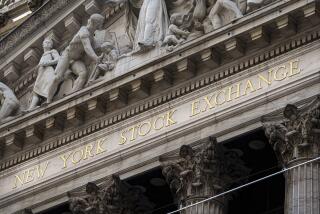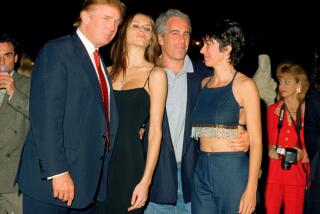What We Can Learn From Global Money Traders
- Share via
“If it’s cheap to borrow Australian dollars, we’ll borrow in Australia. But the client doesn’t want Australian dollars so we swap for U.S. dollars, at fixed rates. But the spread between long-term and short-term rates is huge so we swap fixed for floating rate so the client now has U.S. dollars and an interest rate at the 3% range rather than the 7% level--and he can change his mind later if he wants to.”
The speaker is not some speculator or money launderer, but Dennis Weatherstone, chairman of J.P. Morgan & Co., one of the world’s most powerful banks. He’s describing how banking is done in the new global money market in which $800 billion in currency, stocks, bonds and other financial instruments are traded every day.
This financial trading, which is 100 times the daily total of world trade in merchandise, often seems chaotic, even sinister. “Although the money will be used in the United States, the borrowing will be done through a Luxembourg company because that makes the after-tax effect easier,” says Weatherstone, continuing his description of a typical financing.
But more than speculation is going on. “The trading is maximizing the efficiency of capital movements, bringing together money that is available in one spot but required in another,” says Weatherstone.
The story of Morgan and of Weatherstone, 62, who joined the bank at age 15 in his native London and studied five years at night for a college equivalency diploma, is the story not of chaos or a “casino society”--as some have put it--but of business possibilities opening up because risks can be managed.
Companies do more business overseas because corporate treasurers can buy futures contracts to hedge the risk of currency fluctuation. Pension funds, which invest trillions in bonds and stocks, can be fully invested--thereby earning more and making more capital available to industry--because they hedge with futures on interest rates and stock indexes. Small wonder that the Chicago Mercantile Exchange--subject of a new book by author Bob Tamarkin--handles $12 billion in trading of stock index futures per day, almost double the daily volume of actual stocks on the New York Stock Exchange.
The swaps that Weatherstone talks about satisfy separate needs of different businesses. A small company, which normally could not qualify to borrow long-term at 7%, can assume such a loan from a larger company that will swap for a low-interest, short-term loan because it can handle the risk of fluctuating interest rates.
The message is that innovative markets cope with change. The fact that Americans could so easily refinance their mortgages as interest rates fell in the last year owes a lot to the quickening pace and variety of money markets.
There are other implications. If multinational money moves at warp speed, it will be hard to tax--as the Clinton Administration proposes.
But countries needing capital, such as Mexico, China and Boris Yeltsin’s Russia--in the news this weekend--will be able to get financing as methods are devised to offset risks.
The same could be said for small business and America’s cities, because the obtuse banking industry is changing.
Where once banks saw their business simply as deposits, loans and a profit from the spread between interest paid and interest charged, now the best of them understand broader financial horizons. They gather money for clients in the global market and profit from fees based on swaps and trades in the hundreds of millions. “The client doesn’t want our money,” says Weatherstone, “he wants money--in the cheapest form.”
Morgan, which earned $1.4 billion last year, took in 63% of its revenue from trading, corporate finance, investment management and service fees. Loans were only 26% of its assets. Its ambition is to compete more fully with Wall Street in underwriting stocks and bonds--if a 1930s law can be changed or repealed.
In the world at large, it may already be leading that competition. Raphael Soifer, banking analyst for Brown Bros. Harriman, puts Morgan first among a handful of firms in the forefront of global finance. Others he names include Wall Street’s Goldman Sachs and Merrill Lynch, the banking companies Citicorp and Bankers Trust plus Credit Suisse-First Boston and France’s Societe Generale de Banque. Japan’s big banks, highly touted a few years ago, have dropped from world-class status because of capital problems.
Traditionally stuffy banking is now a business with opportunities for energetic people such as Weatherstone, son of a clerk for the London transit system, who came up through foreign exchange trading. He was a trader with strategic foresight, says a fellow banker.
Morgan was among the first U.S. banks to see change in Mexico. It arranged a refinancing of its Mexican debts in 1989, when Weatherstone was president, and took a write-off to clear the decks for new business. Since then it has underwritten stock issues for major Mexican companies and facilitated Pepsico’s $320-million investment in Empresas Gamesa, Mexico’s largest cookie company.
Today, Weatherstone sees opportunity in the U.S. defense industry--Morgan arranged financing for Lockheed’s acquisition of General Dynamics’ fighter plane division--and in California. “It’s frequently good to come in at a difficult time,” he says, speaking like a banker who knows the possibilities of the global money market.
More to Read
Inside the business of entertainment
The Wide Shot brings you news, analysis and insights on everything from streaming wars to production — and what it all means for the future.
You may occasionally receive promotional content from the Los Angeles Times.










